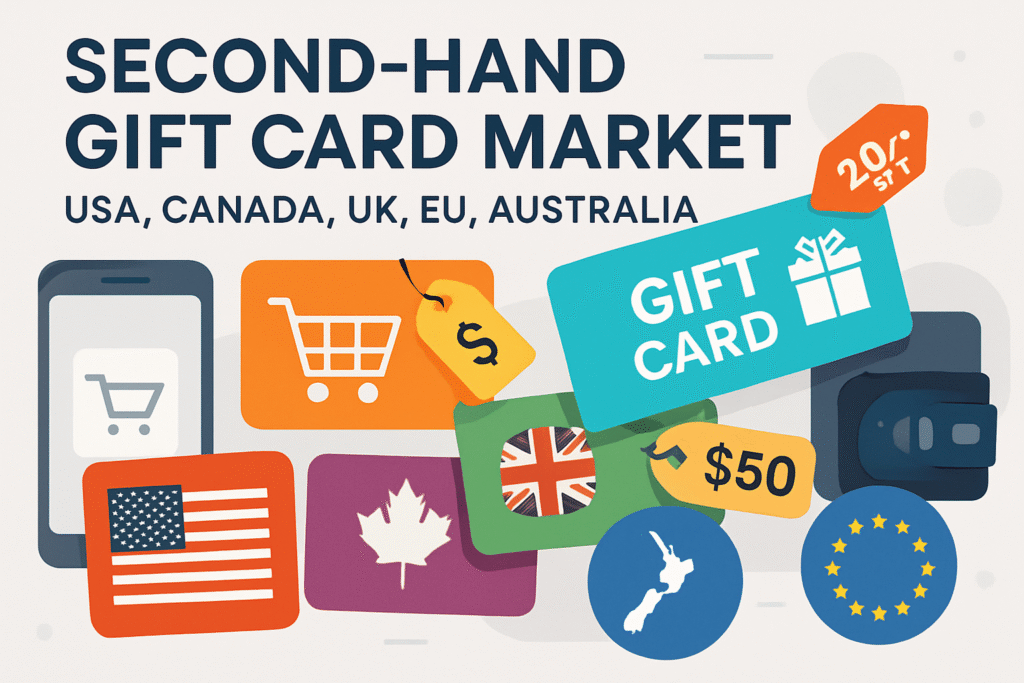

Introduction
In recent years, the second-hand, or “resale” gift card market has rapidly emerged as a significant segment within the broader gift card industry. Driven by factors like consumer demand for savings, the desire to monetize unused cards, increased digitization, and changing retail habits, this secondary market has become a multi-billion-dollar industry across major economies.
USA, Canada, UK, the European Union (EU), Australia, and New Zealand represent mature, high-volume e-commerce regions with widespread gift card usage. This article presents a detailed analysis of the second-hand gift card market size across these geographies, supported by technical statistics, industry trends, growth drivers, and regulatory considerations.
What is the Second-Hand Gift Card Market?
Definition:
The second-hand (resale) gift card market is a digital and physical marketplace where individuals sell unwanted, unused, or partially used gift cards at a discount, and buyers purchase these cards for less than their face value. Facilitated by online platforms, mobile apps, and some brick-and-mortar kiosks, resale gift cards circulate away from their original recipient, unlocking value for both sellers and bargain-seeking buyers.
Market Size Overview: Global Perspective
1. Worldwide Gift Card Market
- Global market value (all cards, not just second-hand):
- Estimated at $900 billion in 2023 ().
- Expected to reach over $1.6 trillion by 2030 ().
- Prevalence of non-redemption:
- Up to 6-10% of issued card balances remain unused ().
- Resale channel’s share:
- The second-hand/resale gift card sector represents a growing but still niche subsegment, typically 2.5%–6% of the total gift card transaction volume globally ().
United StatesUnited States
Market Size & Growth
- The US is the largest second-hand gift card market in the world.
- Approximate market value in 2023:
$3.5 billion in annual transactions (). - Projected CAGR (Compound Annual Growth Rate): 9.8% from 2023–2028 ().
Consumer Behavior & Channel Distribution
- Over 47% of U.S. adults have sold or bought a second-hand gift card at least once ().
- Leading platforms: Raise, CardCash, Cardpool (defunct), Gift Card Granny, Reddit r/giftcardexchange.
- Mobile growth: Over 50% of resale transactions are now initiated via mobile devices.
Retailer Participation
- Brands with the most activity: Amazon, Walmart, Target, Starbucks, Best Buy, Nordstrom, eBay.
- Some brands restrict resale, but most major retailers allow it (with caveats).
Fraud and Security
- Advanced verification and anti-fraud algorithms used by major platforms.
- Card authentication success rates exceed 95%, but overall fraud persists at a rate of 0.5%-2% of total transactions.
Canada
Market Size & Penetration
- The Canadian second-hand gift card market size is smaller in absolute terms, estimated at $700 million CAD (~$525 million USD) in 2023 ().
- Growth rate: 7.2% CAGR forecasted through 2028.
- Leading players: CardSwap, Gift Card Exchange, Kijiji.
Consumer Trends
- 39% of Canadians have resold or purchased a used gift card.
- Online marketplaces and classified sites are particularly popular due to larger rural/remote populations seeking value.
United Kingdom
Market Stats & Trends
- Annual value of second-hand gift card transactions: £350 million in 2023 (~$440 million USD) ().
- The UK has an active digital resale community, with major platforms:
- ZEEK (defunct but previously a market leader), Cardyard, Prezee.
- Digital cards make up over 65% of all transactions.
Regulatory Context
- The UK has stricter consumer protection rules (Financial Conduct Authority oversight, e-money licensing for platforms).
- Most UK resale focuses on high street retailers: Amazon, Marks & Spencer, Argos, Tesco, John Lewis.
European Union
Market Size & Fragmentation
- Estimated EU-wide reseller market: over €1.2 billion in annual value (~$1.3 billion USD) ().
- Key markets: Germany, France, Netherlands, Italy, Spain.
- Large, diverse retailer ecosystem and variable platform availability due to language, regulatory, and market fragmentation.
Technical Insights
- Mobile app penetration is lower than in the USA, but digital wallet integration is growing.
- Gift card resale faces wider regulatory discrepancies across member states, especially regarding validity periods and consumer rights.
Australia
Market Overview
- Valuation: AUD $120 million in annual second-hand card transaction value (~USD $80 million) ().
- Growth rate: 8.1% CAGR.
- Popular platforms: Card.Gift, Prezzee, Gumtree.
Noteworthy Trends
- Uptake is highest in major cities—Sydney, Melbourne, Brisbane.
- Brand preference: Department stores, online marketplaces, supermarkets (e.g., Woolworths, Coles, JB Hi-Fi).
New Zealand
Market Size & Dynamics
- Smaller but healthy market: NZD $25 million per year (~USD $15 million) ().
- Growth rate: 5.9% CAGR.
- Similar platforms to Australia: Prezzee, Trade Me.
Limitations
- Lower card saturation per capita compared to Australia.
- Some geographic and retailer limitations, but steady organic growth.
Technical Statistics & Market Structure
Transaction Data
| Country | Annual Market Value (2023) | CAGR (2023–2028) | Top Platforms | Buyer/Seller Usage |
|---|---|---|---|---|
| USA | $3.5 billion | 9.8% | Raise, CardCash, Gift Card Granny | ~47% have used |
| Canada | $525 million USD | 7.2% | CardSwap, Kijiji, GC Exchange | ~39% have used |
| UK | $440 million USD | 6.5% | Cardyard, Prezee | ~34% have used |
| EU | $1.3 billion USD | 8% | Zeek (legacy), Giftly (varies) | ~30% average |
| Australia | $80 million USD | 8.1% | Prezzee, Card.Gift, Gumtree | ~28% |
| New Zealand | $15 million USD | 5.9% | Prezzee, Trade Me | ~21% |

